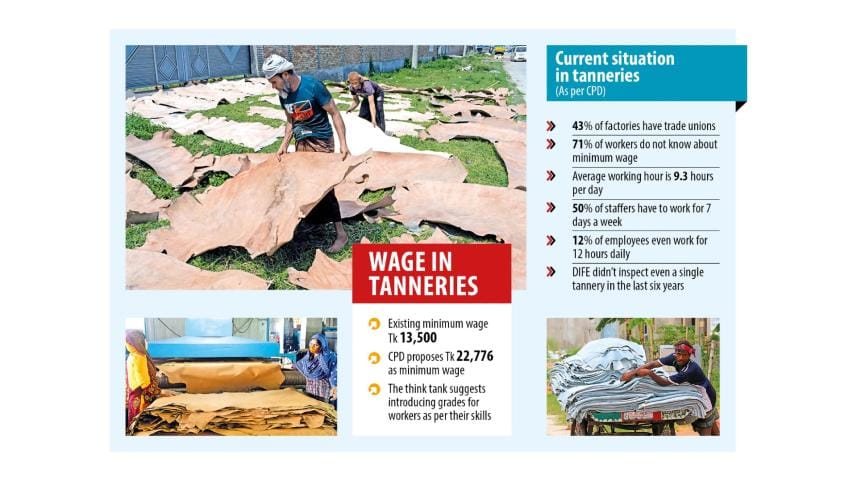CPD for nearly doubling tannery workers’ wages

Tannery workers in Bangladesh should get a minimum monthly wage of Tk 22,776 considering the current market conditions and high inflation in the country, according to the Centre for Policy Dialogue (CPD).
A study by the CPD revealed that a worker's food and non-food expenses stand at a combined Tk 33,478 per month in 2024, or Tk 20,564 and Tk 12,914 respectively.
A minimum wage of Tk 13,500 was fixed for workers of the export-oriented tannery industry in 2018.
"But the owners did not implement that," said Tamim Ahmed, a senior research associate at the CPD, during a discussion and media briefing on the new minimum wage for tannery workers at the CPD office in the capital's Dhanmondi yesterday.
The CPD recently surveyed 35 tanneries and 105 tannery workers in the BSCIC Hemayetpur Tannery Estate in Savar in partnership with OSHE Foundation and under coordination of the Leather Development Forum.
At least 16 percent of the surveyed tannery workers are receiving less than Tk 13,500 as monthly wages despite working in their respective positions for more than a year.
Meanwhile, 43 percent of them received less than Tk 15,881 per month despite having held their position for at least six years.
Around 59 percent of the surveyed workers indicated that they have zero awareness of any sort of grading system in regard to wages.
Also, 71 percent do not know about the minimum wage set by the government, the CPD found.
Under the current wage structure, there are no mechanisms for promotion from one grade to another. Hence, the issue of increments is crucial for this sector.
The survey said that other than the amount paid, deviations between factories were also observed in terms of timely payment of wages.
The lack of implementation of the minimum wage could be attributable to the weak monitoring of the Department of Inspection for Factories and Establishments (DIFE).
The CPD found that 46 percent of the surveyed tanneries had not undergone a single inspection till date.
Liaquat Ali Mollah, chairman (senior district judge) of the Minimum Wages Board for tannery workers, said the tannery owners would not be able to implement the CPD's recommendation.
However, a respectable minimum wage will be fixed through discussions with the owners and workers considering both sides' interests, he added.
Mollah also said working conditions in the tannery industry are hazardous for workers' health, so medical allowances should be included in wages to ensure their livelihood.
"If the workers enjoy sound lives, they will perform better and the owners will do well in business," he added.
Mollah suggested owners ensure that factories are compliant with industry regulations and said they could bargain with buyers for better prices, thereby providing reasonable wages to workers.
However, tannery owners feel that it is not possible to implement the minimum wage proposed by the CPD.
"Tannery owners are not doing well, so implementation of the CPD's proposal is not possible," said Md Shaheen Ahmed, chairman of the Bangladesh Tanners Association (BTA).
Besides, due to the increase in tariffs of electricity and gas, the cost of production has increased, he said.
On the other hand, he said they were being compelled to sell leather to non-compliant Chinese companies at low prices due to the non-compliance of tanneries at the Savar Tannery Industrial Estate.
Still, Ahmed assured they would introduce a reasonable and implementable salary structure following a tripartite discussion including owners, workers and the government.
Ahmed also said they are trying hard to avail Leather Working Group (LWG) certification for at least 10 factories within the next six months, which will help improve their bargaining power with European buyers.
Md Abul Kalam Azad, president of the Tannery Workers Union (TWU), stressed the need for compliant factories and changing the mindset of owners to sustain their business.
According to him, the leather sector has the potential to grow a lot as the required raw materials are easily available in the country.
"So, this industry should be protected at any cost," Azad said.
Md Abdul Malek, general secretary of the TWU, said the tannery industry is different from other industries as it is has some health risks since more than 100 chemicals are used.
"Therefore, we need to give protection to the workers," Malek added.
The session was moderated by Khondaker Golam Moazzem, research director of the CPD. SM Morshed, vice-chairperson of OSHE Foundation, and Md Mizanur Rahman, vice-chairman of the BTA, also addressed the discussion.



 For all latest news, follow The Daily Star's Google News channel.
For all latest news, follow The Daily Star's Google News channel.
Comments